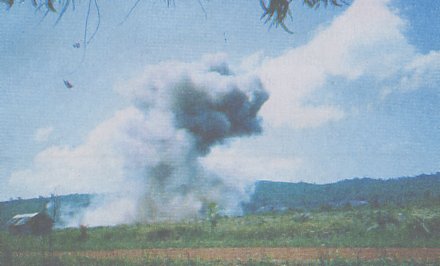View of a Phnompenhois
MAY 6th, 2004
Moeun Chhean
Nariddh - Phnom Penh : Farmers need
irrigation - Before the Khmer New Year, I happened to visit
a Vietnamese village bordering Cambodia's Svay Rieng province. I was astonished
to see many beautiful concrete houses built on the edge of green rice fields.
This tells that the farmers who own them have far better living conditions
than their Khmer neighbors. The secret behind the success of the Vietnamese
farmers can be tracked down easily. It's the flow of water that makes things
flourish. Unfortunately, the world seems to turn upside down on the Cambodian
side of the border.
Destitution
stretches across the Cambodian land. The rice fields have become
cracked by the burning sun following the rice harvest several months ago.
Except for a few motorbikes that carry farm produce from Vietnam, there
is virtually nothing moving during this time of the year.
I decline to use communist Vietnam
as an example for "democratic" Cambodia. But Vietnam's agricultural development
seems very successful. Farmers there grow three
rice crops a year thanks to the advantage of their irrigation
systems, whereas Cambodian farmers depend solely on rainwater and grow
only one rice crop. Thus most Cambodian farmers can hardly make ends meet.
I was told by some villagers that last year many Khmer farmers were hired
to work on the Vietnamese rice fields and some went to collect rice stalks
left behind. However, the situation of Cambodian farmers can be changed.
Many benefits can happen if our farmers have water to farm during the
dry season.
Usually, some farmers would gamble
and drink wine to pass their boring time when there is no farming.
This can result in many problems, including family violence, crime and
theft. While in Vietnam, I saw many young men and women throughout the
village living and working joyfully with their family. Back into Cambodian
soil, we only saw a few youths, as many of them had gone to look for work
in the city where they face or create different social problems. If they
have farming work to do at home, they don't need to go to the city. They
can also live happily in their village in the traditional manner with the
protection of their family.
We know that Cambodia
is going to seek more international aid soon after the new government is
formed. Since more than 80 percent of the population are farmers, both
the donors and the government should make agricultural development a top
priority in their meeting. Instead of giving our farmers food, give
them the means to make more food themselves. Give them irrigation systems
and water to grow more rice crops. Poverty reduction starts here.
[ in Phnom
Penh Post ]
Re : Khmer Word for Department
MAY 7th, 2004
Boran Chhum
: I am a student at the Royal University of Phnom Penh. I read
your mails posted to Camdisc with interest. In one of your mails, you mentioned
about a Khmer word for Department. What was that? Do we need to
translate every new concept by using the Pali and Sanskrit roots? What
is the rationale behind this? I am looking forward to learning from you.

À la recherche d'une grammaire khmère
, https://nearovipen.tripod.com/gramm01.html



